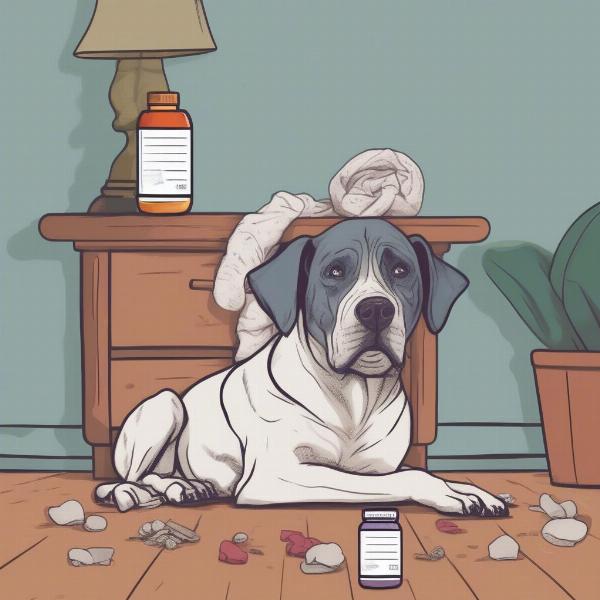The term “mad dog skullcap plant” can be confusing for dog owners. While the name evokes images of a dangerous plant, its actual risk to dogs requires clarification. This article aims to dissect the facts about skullcap plants, focusing on their safety around dogs and addressing the common misconception surrounding the term “mad dog.” We’ll explore what skullcap plants are, their potential benefits and risks, and how to ensure your canine companion stays safe.
Understanding Skullcap Plants and Their Safety Around Dogs
Skullcap plants, belonging to the genus Scutellaria, are a diverse group known for their traditional medicinal uses. While some varieties are considered safe for human consumption, it’s crucial to remember that this doesn’t automatically translate to safety for dogs. The term “mad dog” in connection with skullcap is misleading. It’s likely a misnomer derived from the plant’s historical use in treating rabies, a disease that once earned the tragic label “mad dog disease.” This association doesn’t mean the plant itself is toxic or causes madness.
In fact, some skullcap species, like Scutellaria lateriflora (American skullcap), are used in calming supplements for both humans and animals. However, it’s essential to consult with a veterinarian before administering any herbal remedies to your dog. Different species of skullcap have varying chemical compositions, and some may contain compounds that are harmful to dogs. Never self-treat your dog with any herbal remedy, including skullcap.
Potential Benefits and Risks of Skullcap for Dogs
Some proponents believe that American skullcap can help manage anxiety and stress in dogs. Its purported calming properties might be beneficial for dogs experiencing separation anxiety, noise phobias, or travel stress. However, scientific research on skullcap’s effectiveness in dogs is limited.
 American Skullcap for Dog Anxiety
American Skullcap for Dog Anxiety
The potential risks of skullcap for dogs depend on the species and the dosage. Some species might cause mild side effects like drowsiness or upset stomach. In rare cases, more severe reactions like liver damage have been reported. It’s paramount to emphasize that the indiscriminate use of any skullcap species without veterinary guidance could be harmful to your dog.
Keeping Your Dog Safe Around Skullcap Plants
The safest approach is to prevent your dog from accessing any unknown plants, including skullcap. If you choose to grow skullcap in your garden, ensure it’s in a secure area where your dog can’t reach it. Educate yourself about the specific species of skullcap you have and its potential effects on dogs. If your dog ingests any part of a skullcap plant, contact your veterinarian immediately.
What if my dog eats a skullcap plant?
If your dog ingests any part of a skullcap plant, monitor them closely for any unusual signs, such as vomiting, diarrhea, lethargy, or changes in behavior. Contact your veterinarian immediately, even if your dog seems fine initially. Provide your veterinarian with as much information as possible about the plant ingested, including the species if known, and the estimated quantity consumed.
Conclusion
While the term “mad dog skullcap plant” can be alarming, understanding the facts about skullcap plants is crucial for responsible dog ownership. While some species like American skullcap are used in calming supplements, always consult a veterinarian before giving any herbal remedy to your dog. Prevention is always better than cure. Keep your dog safe by preventing access to unknown plants and seeking immediate veterinary attention if ingestion occurs.
FAQ
-
Are all skullcap plants toxic to dogs? Not all skullcap plants are inherently toxic, but their safety depends on the species and dosage. Some species may be harmful to dogs, while others are considered safe in controlled amounts. Always consult with your veterinarian before giving your dog any herbal remedies.
-
What should I do if my dog eats an unknown plant? If your dog ingests any unknown plant, contact your veterinarian immediately. Provide them with as much information as possible about the plant and the amount consumed.
-
Can I give my dog American skullcap for anxiety? While some believe American skullcap can help with dog anxiety, there’s limited scientific evidence to support this. Always consult your veterinarian before giving any herbal supplements to your dog.
-
Is the “mad dog” in “mad dog skullcap plant” referring to rabies? Yes, the term “mad dog” likely stems from the plant’s historical use in treating rabies, historically known as “mad dog disease.” It doesn’t mean the plant itself is toxic or causes madness.
-
How can I make my garden safe for my dog? Ensure your garden is free of toxic plants and secure areas where your dog can’t access potentially harmful vegetation. Research dog-friendly plants and create a safe and enjoyable outdoor space for your furry friend.
-
Are there any safe alternatives to skullcap for dog anxiety? Several safe and effective options for managing dog anxiety include behavioral training, pheromone diffusers, and prescribed medications. Consult your veterinarian to determine the best approach for your dog’s specific needs.
-
Where can I find more information about toxic plants for dogs? Reputable resources like the ASPCA’s Animal Poison Control Center and the Pet Poison Helpline offer comprehensive lists of plants that are toxic to animals.
ILM Dog is your trusted source for comprehensive and practical information on dog care and well-being. We offer expert advice on everything from breed selection and health care to training, nutrition, and grooming. Our mission is to empower dog owners worldwide with the knowledge and resources they need to raise happy, healthy, and well-adjusted dogs. For tailored advice and guidance, connect with our team of experts at [email protected] or call us at +44 20-3965-8624. Visit ILM Dog today for all your canine care needs.